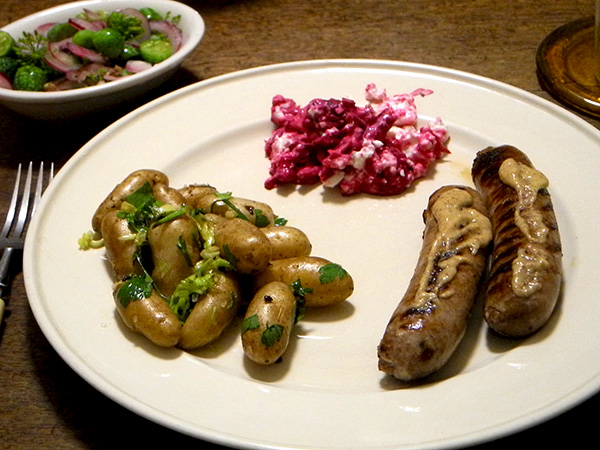I tweaked my German.
Meaning the cookery. I bought some frozen Vermont ‘beer brats’ on a whim while I was at the Greenmarket on Wednesday. My enormous family is from Sheboygan and Calumet Counties in Wisconsin, where ‘brats‘ are an obsession, and the sausages played a huge role in our enormous annual family reunions. For perspective, note that I have approximately 100 first cousins alone, and at the last reunion of my Mother’s Franconia-rooted family, when we signed in, each branch of the Woelfels was given a name tag with a different color code (I did say my family was German).
I know brats. And I know Bratwürste.
I like German food, and I take enormous pleasure in it on visits to central Europe, and occasionally at home. Most of the time the plates don’t stray far from tradition, if at all, but this time I found myself moving beyond it just a little. The occasion was both necessity (the ingredients on hand and not on hand, the time available, and the summer heat of a kitchen).
- beer brats from Tamarack Hollow Farm, whose ingredients are pork, Vermont Harpoon IPA, salt, black pepper, sugar, garlic, and spices, pan-grilled (traditionally they would grilled on charcoal in the open, smoky air), and served with a real German mustard
Now the real tweaking begins.
- La Ratte potatoes from Berried Treasures (a small buttery and nutty tuber, more French than German), boiled until barely tender, drained, dried, rolled in a little butter, tossed with parsley and celery tops (the latter bit probably not very German)
- baby beets (‘baby beets’ doesn’t sound very German) from Tamarack Hollow Farm, whose tops we had enjoyed a few days earlier), steamed until tender, which is also not very German but I wanted to avoid the oven, then halved, mixed with a marinade of yoghurt, white wine vinegar, crushed caraway seeds, a pinch of sugar, red onion (not German) from John D. Madura Farm, and some amazing parsley [yeah, amazing parsley!] from Paffenroth Farms, and some lovage (not traditional) from Keith’s Farm, the salad allowed to chill for an hour or so before some French Valbreso sheep feta cheese from Whole Foods was turned into it
- tiny Mexican gherkins or ‘Sandita’, from Norwich Meadows Farm (not the ‘cukes’ my Mother used all her life), halved, then tossed with thinly-sliced red onion (un-German) from John D. Madura Farm, ground white pepper, a little sugar, and some salt, dill flowers from from Crock & Jar/Rise & Root, covered with a mixture of half water-half white organic vinegar, chilled for an hour
- the bottles of beer (truly German), each of which we shared, were, in succession, Spaten Münchner Hell, Weihenstephaner Vitus [damn good beer], Schneider Weisse; they are all from Munich, although the Weihenstephaner (established in 1040) is actually brewed a few miles north of that city, in Freising, one of the oldest settlements, or towns, in Bayern, and the seat of a bishop from 739, no doubt explaining the high quality of its beer
- the music was Ravel’s ‘Gaspard de la nuit‘, and Beethoven’s third piano sonata, both played by Arturo Benedetti Michelangeli
